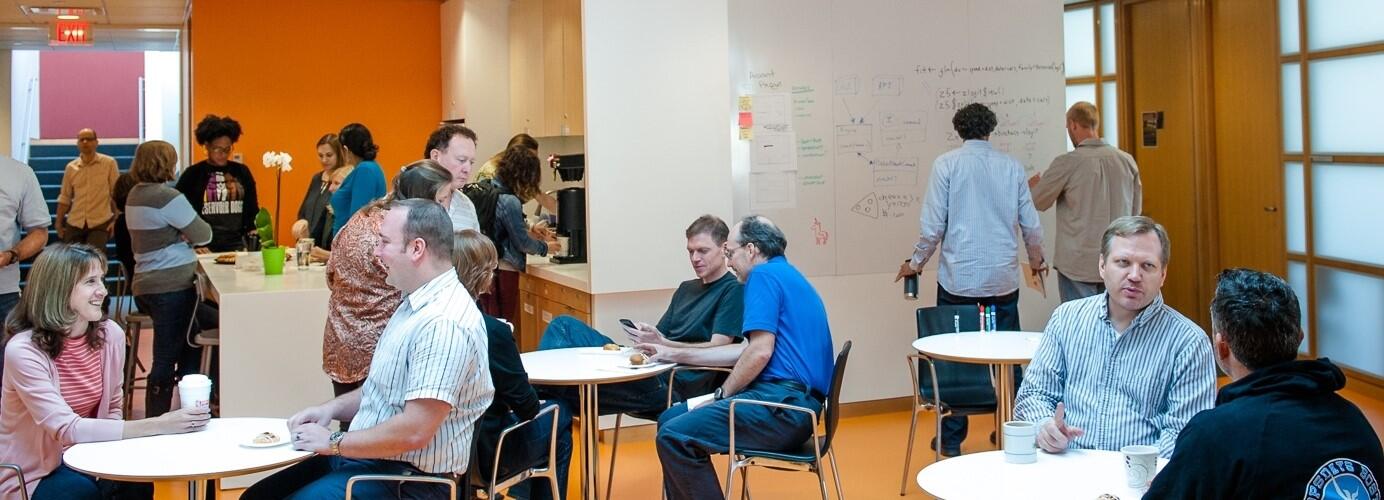
The challenging projects at IQSS attract a variety of visiting collaborators to our research community—but one visiting professor was so excited by her work that she chose to call the Institute home. Christine Choirat originally joined the Institute for Quantitative Social Science in the summer of 2013 as a visiting scholar, when she realized that her work with Mercè Crosas and the Data Science team resonated strongly with her own research interests and values.
A Multi-disciplinary Scholar
Christine received a masters degree in Quantitative Finance and a PhD in Applied Mathematics in 2003, both at Paris Dauphine University. Though her work was that of a theoretical statistician, in her spare time she took interest in programming languages and Linux kernels, and in her post-doctoral work she studied the psychology of decision making in Italy. In 2006, Christine joined the University of Navarra (Pamplona, Spain), where she served as professor of quantitative methods and Director of Research in the School of Economics and Business Administration. As Director of Research, her mission was to help the School improve the quality and visibility of its research output, which involved redefining the School's research priorities (now banking and industry) and industrial partnerships, and helping to organize national and international conferences. Christine divided her own research between two fields: theoretical and computational statistics (e.g. random sets, asymptotic theory, Monte Carlo and Quasi Monte Carlo) and decision making, with elements of experimental economics and mathematical psychology. She used computer-based experiments to assess the validity of decision-making procedures and develop statistical models to correct observed biases.
Summer at IQSS
When she came to IQSS as a Visiting Scholar from April–August 2013, Christine wanted to develop new Zelig models and to contribute to the documentation effort across projects. She assisted with the migration of Dataverse documentation to Sphinx, and she contributed to the plans for a major development cycle for Zelig. Though she returned to a tenured professorship at the University of Navarra in the fall of 2013, she found it difficult to leave IQSS; "I literally fell in love with Mercè’s Data Science Team!" Christine says. "The core values of IQSS—open source software development, reproducibility, unification of statistical methodology across disciplines—are the ones I’ve always tried to follow as a researcher." She ultimately chose to leave her professorship to return permanently to IQSS in 2014, and she is very grateful to her former Dean and colleagues for supporting her decision.
Here to Stay
In her new position at IQSS as Research Associate, Christine's main project is Zelig 5, which is expected to be released in mid-June, 2014. Zelig 5 will see a major redesign, she explains, that takes advantage of the newest R capabilities in terms of object-oriented programming. The modular structure of Zelig 5 will make it easier for code to be maintained and extended, and for users to contribute models. The Zelig team will also be putting a lot of effort into documentation, and it will provide wrappers to make Zelig 5 backwards-compatible with previous Zelig versions. A series of incremental releases will follow throughout Fall 2014, with a special focus on the tunability of the plots and the implementations of new classes of models including times-series, panel data, and hierarchical models.
Christine also dedicates a great deal of time to a collaboration with the Harvard School of Public Health (HSPH), where she is involved in a project led by Francesca Dominici and Cory Zigler. "Environmental datasets (e.g., hourly pollutants measurements all over the country) are typical examples of big data that have to be analyzed using advanced statistical methods," she says of the project, which she presented at a recent HSPH seminar on April 4. "Add to that the emphasis that national institutes such as NIH is putting on to enhancing reproducibility, and you get all the ingredients of the IQSS approach."
Welcome Home
"I am honored to be a part of Gary King's group at IQSS," Christine says, "which I see as having the perfect mix of academia and startup: it’s a creative, extremely collaborative, interdisciplinary and result-driven environment that allows for innovative research and technology to thrive and grow." We at IQSS were excited to see Christine return to the Institute this year, and we look forward to more of her exceptional work.
by Elizabeth Salazar
IQSS Spotlights feature individual members of the IQSS community to offer a closer look at the many people who contribute to the Institute's research.

